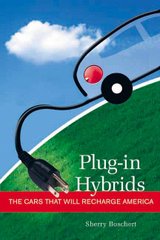News of oil by the barrel and gas by the gallon reaching new highs had been dominating TV and print, so it was perhaps not surprising that the Google/Brookings Plug-in Electric Vehicle Conference saw overflow crowds. The speeches and hallway chatter suggested plug-in vehicles have finally caught the attention of industry bigwigs and policy makers. Auto makers, electric utilities, battery makers and advocates all found themselves under one roof in the nation’s capital, and all said regarding plug-in vehicles it is a matter of “when” not “if.”
Many of the speeches sounded notes long trumpeted by advocates at Plug In America and the Electric Auto Association. The benefits to the environment were repeatedly mentioned, and the national security rationale for plug-ins was brought to the fore. The state of the grid was discussed by advocates and utility executives. Some concern was voiced about the day tens of millions of cars charge up from and contribute to the grid. Yet there was near unanimity that the utility infrastructure can handle the plug-in cars being introduced in the near term.
Politicians from both parties, both long-term advocates of alternative fuels and long-term defenders of every auto maker misstep, found themselves largely in agreement. Republican Senators Lamar Alexander and Orrin Hatch, and Democratic Congressmen John Dingell and Jay Inslee spoke to the attendees, with each recognizing the need for policies promoting grid electrification of automobiles.
GM President Tory Clarke's concluding keynote on Thursday kept expectations up for the November 2010 release of the Volt. Bill Reinert of Toyota played the contrarian, forecasting a return, albeit temporary, to $2/gallon gasoline. The President of Ford bored plug-in proponents with tweaks to the internal combustion engine and appeals to the feds for hand-outs.
Fred Smith, CEO and Founder of Federal Express summed up the hopefulness expressed by many speakers and attendees about the broad possibilities for plug-ins beyond passenger vehicles. The possibility of plug-in trucks to reduce the ever-increasing fuel costs for a package delivery service are very attractive, he asserted. And, when his interviewer referred to plug-in hybrids, he insisted that all-electrics be part of the conversation and the commercial vehicle mix. When a questioner challenged him to move from rhetorical support to issuing an RFP for actual vehicles, he didn’t flinch.
One couldn’t help leaving the conference with the excitement of feeling part of an idea whose time has come.
Friday, June 13, 2008
Subscribe to:
Post Comments (Atom)



10 comments:
It's nice to see an event such as this so well attended. The unfortunate thing is it took $4 a gallon gas prices to get the auto makers attention. Although I will admit it's hard to ignore a 60% drop in sales.
Plug-ins rates more largely because batteries are expensive.
Just catching up on reading a year’s worth of always-excellent Marc Geller blogposts. With the benefit of now 6 months hindsight from when this was posted, ever-iconoclast Bill Reinert looks to have been the smartest guy at the conference, a prescient genius, doesn’t he? Who wouldda thunk back in those lofty summer heydays of $147 oil and $4.30 gas that we and our EV fortunes could sink so low? Bill certainly called it right. The EV/gasoline-price correlation vicissitudes rollercoaster rides on!
Charles Whalen
very nice!thanks
I really like this write! I enjoy it so much! thanks for give me a good reading moment!
I really like this write! I enjoy it so much! thanks for give me a good reading moment!
Nice effort, very informative, this will help me to complete my task
your articles, I guess I am not the only one having all the enjoyment here! Keep up the good work.
We can buy oil from McDonalds as alternative.
I am not sure but will this Plug-in thing work? I really don't think so. Great post though.
Post a Comment